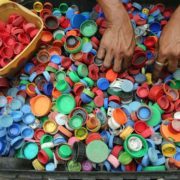What’s the deal with the Plastic Soup again?
March 15 2024 That’s what readers of news site nu.nl on their comment platform Nujij were wondering. In a recent […]
Amsterdam, 19 October 2018 – Microplastics float around in oceans, but can also be found in large numbers in rivers and lakes. Species that live in these waters, such as insect larvae, can therefore be exposed to plastics. For the first time, an Irish scientific research shows that grown mosquitoes carry microplastics inside of them, which they ingested as larvae.
The researchers experimentally exposed mosquito larvae to microplastics the size of 0.0002 centimeters and 0.0015 centimeters. It appears that mosquito larvae mostly ingest larger quantities of the smaller microplastics, varying from 2500 to 5048 particles. The larger microplastics were found in numbers of 91 up to 650 particles per larva. Subsequently, the researchers examined whether the microplastics were still present in the adult mosquitoes after pupating. They almost exclusively found the smaller microplastics, even though there was a decrease of the quantity of these microplastics, with particles in an adult mosquito varying from 11 to 78. Possible health consequences for the mosquitoes were not examined.
This research shows that microplastics can be transferred from polluted rivers to less polluted areas through mosquitoes. The scientists therefore pose that other flying insects that develop as larvae in polluted water will most likely ingest microplastics too.
That last postulation seems to be confirmed by another, almost simultaneously published, research. This research established that almost 50% of all insects in freshwater systems in South Wales carried microplastics inside of them. Species who eat these insects, such as birds or bats, are therefore also at a risk of being exposed to microplastics.
Maria Westerbos, director of the Plastic Soup Foundation: “The fact that insects can pass on microplastics is new and alarming. Is there a connection with the massive insect death rate? Researchers should prioritize this question immediately.”
Also read: Bristle worms eat plastic
March 15 2024 That’s what readers of news site nu.nl on their comment platform Nujij were wondering. In a recent […]
The first Impact Fair is Europe’s largest Impact Experience. An interactive ‘immersive’ experience of impactful examples.
The waste-export to countries outside of the EU has been restricted The Netherlands is against a carpet ban on shipping of plastic waste.
The waste-export to countries outside of the EU has been restricted The Netherlands is against a carpet ban on shipping of plastic waste.

 EU Parliamentarians join cleanup, day before the vote on Plastics Strategy
EU Parliamentarians join cleanup, day before the vote on Plastics Strategy